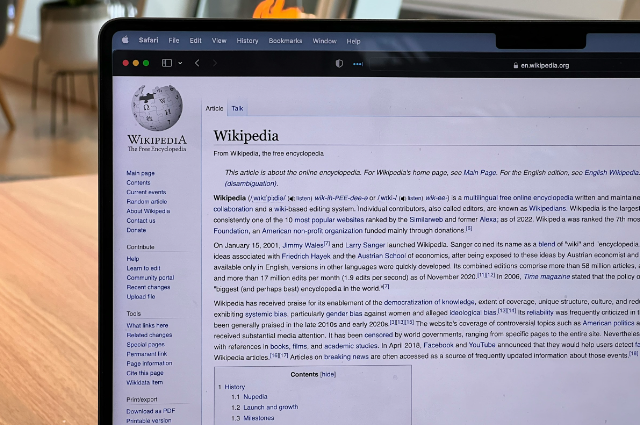
Photo by Oberon Copeland on Unsplash
It’s a platform we've all used since childhood for school projects, quick research, and more. But now, the very site we rely on for information is facing criticism and controversy. Could Wikipedia be causing trouble?
The Delhi High Court recently directed Wikipedia to remove all false and defamatory content against news agency ANI ( Asian News International) and stated that the platform, being an intermediary, has some responsibilities and obligations to prevent acts of defamation.
Before we dive deeper into the case, let’s understand the key concepts at play.
Defamation
Defamation is when someone makes a false statement about another person, group, or organization that harms their reputation. It can be spoken of as slander or written/published, called libel. For something to be considered defamation, the statement must be false, shared with others, and cause real damage to the person's or entity’s reputation.
In India, defamation is both a civil and a criminal offense. A person found guilty can be ordered to pay damages and may even face imprisonment under certain circumstances.
Let us again take a look at freedom of speech...
Freedom of speech is the right to express your opinions and ideas without fear of government censorship or punishment. It’s a fundamental right in most democracies. However, it’s not unlimited. You can’t use this freedom to spread hate, incite violence, or defame others. So, speech that crosses into defamation, threats, or misinformation may not be protected under free speech laws.
The Delhi vs. Wikipedia case
The government claimed that certain information published on Wikipedia was false and harmful, potentially affecting public perception and causing unrest. From their perspective, this wasn’t just a matter of sharing opinions; it was defamation because the content allegedly damaged the reputation of officials or institutions without proper evidence.
On the other hand, Wikipedia works on the principle of freedom of speech and open knowledge. Anyone can edit its pages, and it relies on its community to fact-check and add sources. Wikipedia might argue that the content was simply part of public discourse, not meant to defame anyone.
Freedom of expression and defamation can get blurry online. It sparks a bigger question:
How do we protect free speech while holding platforms accountable for spreading false or harmful information?
Fun Fact: Wikipedia has over 6.8 million English articles and is edited over 350 times per minute! So, chances are, while you’re reading this, someone is already updating a fact somewhere on the site.
Where’s the Line?
This case brings us to a critical debate: Where do we draw the line between freedom of expression and defamation in the digital space?
Social media platforms, blogs, forums, and open encyclopedias like Wikipedia have revolutionized how we share and consume information. Anyone with a device and an internet connection can now publish their views to a global audience. But with this power comes the risk of misinformation, fake news, and targeted defamation.
The Delhi vs. Wikipedia case is not just about one article on one website. It reflects a much larger concern: how to strike the right balance between empowering people to share information and ensuring that such information does not harm others unfairly.
Implications of the Case
This case could set an important precedent. If Wikipedia is held liable for user-generated content, it might lead to tighter regulations on similar platforms. They may be required to develop stronger content moderation systems, faster response mechanisms, and more robust verification protocols.
On the flip side, overly strict regulation could suppress genuine contributions, critical opinions, and freedom of thought. It could lead to censorship or discourage people from participating in public dialogue.
So, the challenge lies in finding a middle ground.
Governments must ensure that platforms act swiftly when alerted about harmful content. At the same time, platforms need clear guidelines on what constitutes actionable defamation, to avoid misuse of the law to silence legitimate criticism.
Fun Fact: The term “Wikipedia” is a combination of “wiki” (a Hawaiian word meaning “quick”) and “encyclopedia.” And yes, it lives up to its name; it’s the 5th most visited website in the world!
To sum it all up this case is not just a legal drama but a cultural moment. It reflects our times, where a single sentence online can reach millions, influence opinions, and sometimes even mislead. The Delhi High Court’s decision urges platforms to stay vigilant while reminding users like us to think before we post, edit, or share.
Digital Literacy Matters
This entire debate also brings forth the urgent need for digital literacy. It’s not just about knowing how to use technology but understanding the ethical, social, and legal implications of digital actions. Schools and colleges must emphasize critical thinking, fact-checking, and understanding the difference between free speech and harmful speech. Informed users are the first line of defense against misinformation.
Let’s not forget that Wikipedia, despite its flaws, is still a brilliant example of collaborative knowledge. It has documented wars and peace treaties, cultures and cuisine, memes and revolutions. It's where the world writes its rough draft of history. But like any draft, it needs editing, refinement, and accountability.
In today’s digital age, where attention spans are short and virality is instant, the power of a single edit, true or false, can ripple across the globe. This case is a timely reminder that while the internet gives us freedom, it also demands responsibility. Whether you're a creator, a platform, or just someone scrolling by, you’re part of the story. Let’s write it wisely.
So, while we demand more responsibility from platforms, let’s also demand more awareness from ourselves. Because truth online isn’t just built by policies; it’s built by people.
Fun Fact to End On: In 2008, someone edited the Wikipedia page of an elephant named "Motty" to claim he had once flown a helicopter. It stayed up for days before being corrected, proof that while the internet can be wild, it's up to us to keep it wise.
